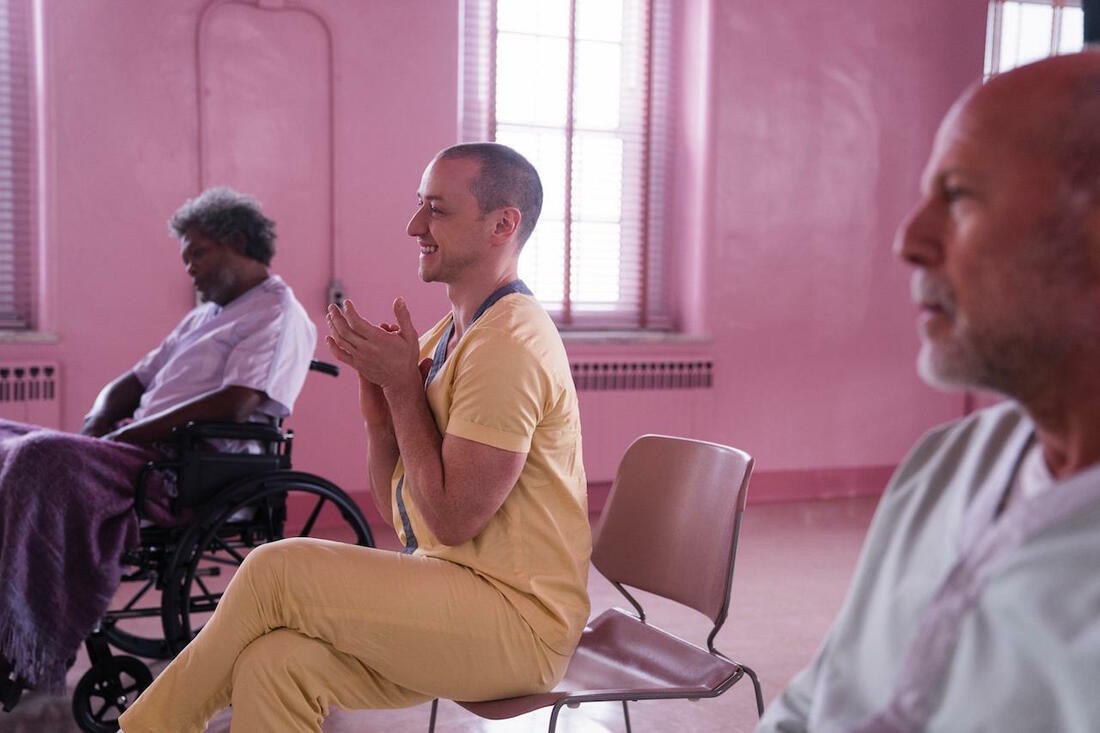Review:
"Glass"

Release Date: Jan. 18, 2019
Rating: PG-13 Running Time: 129 minutes Is it a coincidence that M. Night Shyamalan began his Eastrail #177 trilogy with 2000’s Unbreakable the same year that X-Men kicked off the modern era of the superhero film franchise? And completes it with Glass the same year that the Fox Marvel Cinematic Universe comes to a liklely end with this summer’s upcoming X-Men offerings Dark Phoenix and The New Mutants? Or that Shyamalan’s trilogy shares stars with both the X-Men (James McAvoy a.k.a. the young Professor Charles Xavier, and Anya Taylor-Joy of The New Mutants) and the Marvel Cinematic Universe (Nick Fury himself, Samuel L. Jackson). Maybe it is a coincidence, but if we learned anything from Unbreakable—and can take away from Glass—is that there are no coincidences when it comes to Samuel L. Jackson’s scheming Elijah Price, a.k.a. the nefarious Mr. Glass. The events that began with Unbreakable, and continued with 2017’s Split, reach their culmination with a clash of the superpowered in Glass. The less said the better about how and why superpowered trio Price, Kevin Wendell Crumb (James McAvoy), and David Dunn (Bruce Willis) end up in the same Philadelphia psychiatric hospital under the treatment of the disbelieving Dr. Ellie Staple (Sarah Paulson). But they do, and given Dr. Staple and her staff continually underestimate the seemingly catatonic Price, it comes as no surprise that Price eventually teams up with Crumb—and, of course, many of Crumb’s 24 personalities, collectively known as The Horde and led by the fearsome Beast. Yes, Glass is a showdown between Mr. Glass, The Beast, and Dunn, now dubbed The Overseer in the press because of his vigilante activities. Shyamalan splits Glass into three distinct acts: reintroducing his hero and villains, putting in motion Price’s plan, and staging a climax that may be a tough sell for audiences weaned on traditional superhero film endings. “Everything extraordinary can be explained away, and yet, it is true,” Price says in response to Dr. Staple’s efforts to convince her patients that their superpowers are nothing more than a product of their imagination. For Shyamalan, a big comic-book fan, this trilogy has always been less about the actions of the superpowered than the overwhelming need to recognized for being different. An insular loner who prefers to work in the shadows, Dunn is the exception Shyamalan measures Price and Crumb against. For Price, public recognition would be the defining moment of his life’s work, as he believes that comic books serve as a historical chronicle of the superpowered. For Crumb, or at least The Beast and members of the Horde, it would be an acknowledgment of The Beast’s campaign to eliminate the world of those who have never had to suffer and by default or impure. From there, Shyamalan conducts a case study in good and evil and how the two often can be blurred depending on intent, action, and consequences. As with Unbreakable, and somewhat with Split, Shyamalan is less concerned with showing his superpowered hero and villains in action than in the dialogue that occurs between them before the gloves comes off. Dr. Staple facilities and leads the dialogue, with Shyamalan initially positioning her as a substitute for those equally skeptical of her patients’ claims. But Paulson immediately gives us a sense that Dr. Staple likes to hear the sound of her own voice as much as she wants to engage with her patients. Of course, this is often a one-sided conversation given that a wheel-bound Price is apparently drugged to the eyeballs and unresponsive for the first act and Dunn internalizes everything just as he did in Unbreakable. This leaves McAvoy the center of attention for the first act, and given how effortlessly he slips in and out of Crumb’s 24 personalities both verbally and physically, he infuses Glass with much of the first act’s energy. The debate comes to an end when Price stirs from his slumber, allowing Jackson to immediately make his presence felt and steal Glass away from McAvoy. When Price becomes an active participant in Glass, and Split survivor Casey Cooke (Anya Taylor-Joy) engages with Crumb, Shyamalan increasingly explores the way childhood trauma—emotional, physical, sexual—impacts the victim for the rest of their live while altering their worldview. Shyamalan is most intrigued in how trauma has shaped his characters—both superpowered and non-superpowered—and what led them to choose the path they have taken. Shyamalan clearly missed the challenge of writing for Mr. Glass, and his love of writing for Crumb is evident, and so Glass mostly focuses on the seemingly mutually beneficial relationship that develops between the two bad guys. To this end, Dunn comes across as a third wheel. Shyamalan has very little to say about Dunn that he did not already say in Unbreakable. Which explains why Shyamalan shifts his attention to Dunn’s son Joseph (Spencer Treat Clark, now all grown up) and his unwavering belief in his father’s powers. This is Shyamalan’s way of analyzing Dunn without having to write for him. The knock on Bruce Willis is that he has not given a fully engaged performance in more than a decade. Then again, why would Willis considering he’s spent the past five or six years in VOD purgatory? If Willis goes through the motions in Glass it is because Shyamalan’s lack of interest in Dunn is felt harder than a punch in the face. With Glass, Shyamalan falls into the trap of being so with enamored with his villains that the hero is reduced to being nothing more than a poncho-covered symbol of truth and justice. Of course, Dunn is called into action during the final act, when he and goes up against Mr. Glass and The Beast. Given Glass is a relatively lowkey and intimate affair for its first two acts, it is not surprising that the climatic dustup is executed on a smaller scale that your $200 million Marvel superhero adventure. Shyamalan keeps the stakes high and offers a satisfying reveal involving Dunn, Price, and Crumb. He also serves up an uncompromising ending that may alienate casual fans of superhero films. But Shyamalan cannot resist adding a groan-inducing plot twist—one that borrows from the themes that run through The Dark Knight—that conveniently opens the door for another sequel, if Shyamalan wants to go in that direction. But it also adds an unnecessary element to Glass to distract from the agenda pursued by one of its antagonists. We all know Shyamalan likes endings designed to rock us in our seats and leave us talking long after the end credits. But, as Glass proves once again, Shyamalan doesn’t know when to leave well enough alone. Robert Sims Aired: Jan. 17, 2019 Web site: https://www.glassmovie.com |
|
